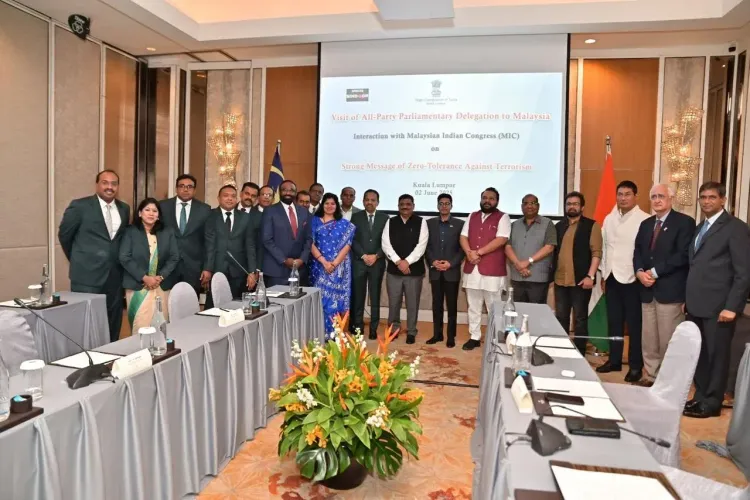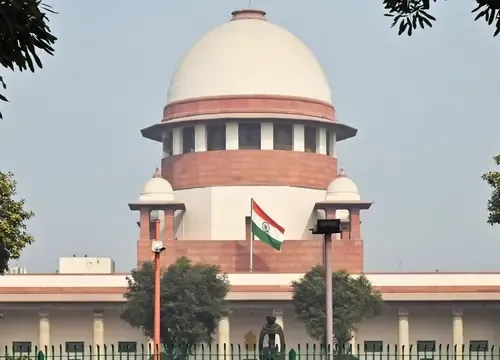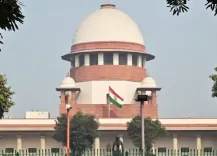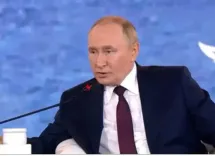How Did the Indian Delegation Convey India's Stance on Terrorism to Malaysian Leaders?

Synopsis
Key Takeaways
- India's zero tolerance policy against terrorism emphasized.
- Engagement with Malaysian leaders to strengthen ties.
- Focus on Operation Sindoor as a strategy.
- Importance of international cooperation to combat terrorism.
- Reaffirmation of India's national security commitment.
Kuala Lumpur, June 3 (NationPress) An all-party Indian Parliamentary delegation, spearheaded by Janata Dal United MP, Sanjay Kumar Jha, conveyed India's position on countering cross-border terrorism to influential Malaysian political figures in Kuala Lumpur, as part of its diplomatic and public outreach efforts.
The delegation engaged in high-level discussions with representatives from major Malaysian political parties and think-tanks, articulating India's unwavering commitment to zero tolerance against terrorism in all its forms, as stated by the Indian Embassy in Malaysia in a press release on social media platform X.
This visit reinforced India's national consensus on implementing decisive and proportionate responses to combat terrorism and its backers, according to the embassy's statement.
Under the leadership of Prime Minister Narendra Modi, India is dedicated to ensuring national security by collaborating with strategic partners like Malaysia to tackle the menace of cross-border terrorism, the Indian Embassy highlighted.
The delegation, led by Sanjay Kumar Jha, included BJP MPs Aparajita Sarangi, Brij Lal, Hemang Joshi, and Pradan Baruah, Trinamool Congress MP Abhishek Banerjee, CPI(M) Rajya Sabha member John Barittas, senior Congress leader Salman Khurshid, and former Indian Ambassador to France, Mohan Kumar.
Following visits to Japan, South Korea, Singapore, and Indonesia, the delegation arrived in Malaysia for the final phase of its tour, aimed at emphasizing the importance of Operation Sindoor and India's ongoing battle against Pakistan-sponsored cross-border terrorism.
During a meeting with the Parti Keadilan Rakyat (People's Justice Party), led by Sim Tze Tzin, the delegation outlined India's steadfast approach under Operation Sindoor, reaffirming unity against cross-border terrorism, as noted by the Indian Embassy in Malaysia.
The PKR representatives expressed appreciation for the detailed briefing provided by the Indian delegation.
The leader of the delegation, Sanjay Kumar Jha, also engaged with Saraswathy Kandasami, Deputy Minister of National Unity, during their discussions.
The delegation had fruitful conversations with the Democratic Action Party (DAP), led by M. Kula Segaran, Deputy Minister in the Prime Minister's Department (Law and Institutional Reform).
India's insights and resolve against terrorism were effectively communicated.
Discussions revolved around India's determined actions against cross-border terrorism under Operation Sindoor, along with India's diplomatic initiatives concerning the Indus Water Treaty, emphasizing that "Water and blood cannot flow together."
The delegation also met with senior figures from the Malaysian Indian Congress (MIC), led by Tan Sri Dato Sri S.A. Vigneswaran and Deputy President Datuk Seri M. Saravanan, highlighting India's steadfast stance against terrorism and signaling India's new approach to responding firmly to any acts of terror on Indian soil.
The MIC leadership expressed solidarity with India's fight against terrorism.
In an engaging dialogue with leading Malaysian think-tanks and academia, including the Asia Europe Institute, Economic Club of Kuala Lumpur, Institute of Strategic and International Studies, the delegation informed them about the horrific terrorist attack in Pahalgam and detailed the ongoing Operation Sindoor, which represents India's precise, measured, responsible, and non-escalatory response.
The delegation elaborated on India's zero-tolerance policy towards terrorism and stressed that India will no longer differentiate between terrorists and the nations that harbor them.
The discussion commenced with a think-tank delegate praising the nine-member all-party delegation as 'Navaratnas' from India, commending the 'All Party' composition of the group.
Deliberations centered on India's new norms and security doctrine in the fight against cross-border terrorism, alongside strategies to enhance international cooperation in the collective battle against terrorism in all its forms.
These engagements form part of India's determined diplomatic initiative to project a unified and principled stance on terrorism.









